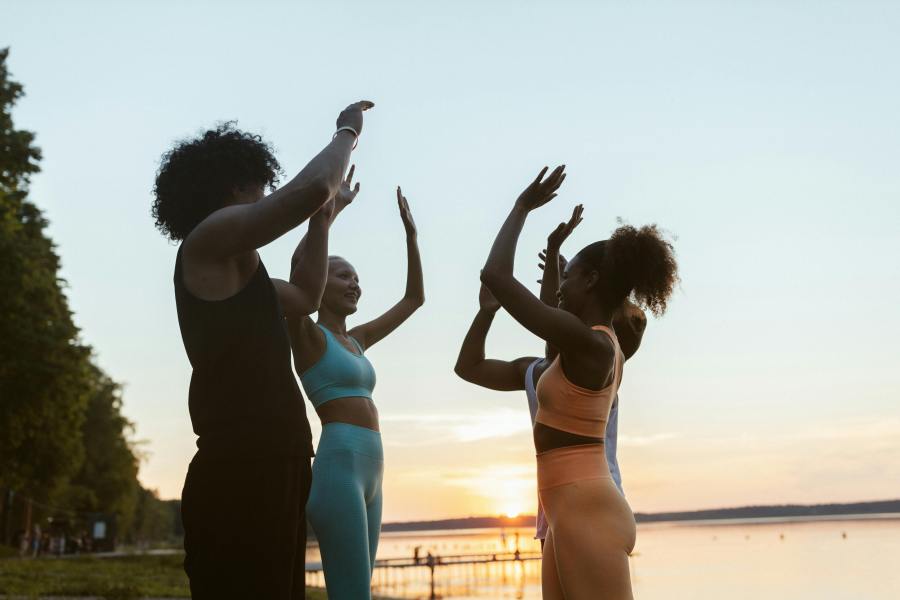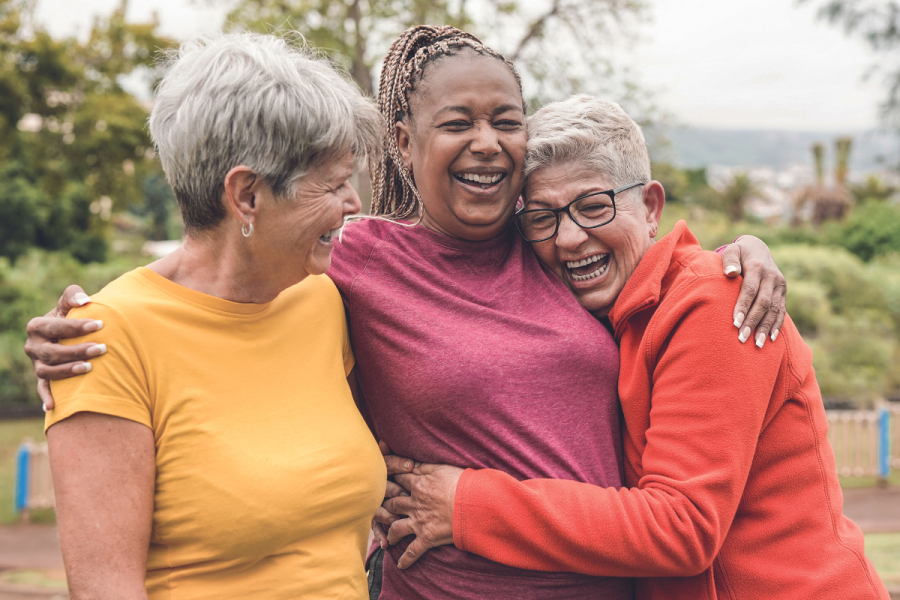With International Friendship Day on July 30, communication coach Amy Carroll explains why healthy friendships are essential to your physical and mental wellbeing, plus how a friendship check-up will benefit you both!
You’ve probably never given a second thought to the idea that your friendships can benefit from a health check-up – a bit like you’d MOT your car. Indeed, not having a check-up can lead to breakdowns for friendships as well as for cars! Years ago, I went on an extended holiday with a group of friends. We travelled to three countries in about four weeks. Imagine five of us, sharing one small house, eating and socialising together. Naturally, tensions built-up and by mid-trip (literally mid-air, between countries!), there was a clash between myself and a fellow traveller.
So, when things got ugly, it became very uncomfortable. At one point, I started feeling alone and isolated, unsure how to navigate the remaining 10 days. I found myself on the beach, alternately calling two of my closest friends, one of whom, Karen, stepped fully into “Team Amy” mode. We had a good giggle about the drama of humans and she helped me get perspective on the situation.
In addition, my friend Emma, whom I call “Empathy Emma”, gave me loads of emotional support, which immediately helped me relax and refocus. We then worked on what I could say to this challenging individual. I wanted the message to be kind, authentic, and truthful with the hope of reducing tensions. I’m pleased to say, it worked like magic and we had a delightful time for the rest of our travels. I believe that if I didn’t have those friends to turn to, I might have continued to suffer for the rest of that trip. Both my friends helped me feel calm and understood, and helped rebuild my resilience and find a solution.
In fact, scientific research suggests healthy friendships provide many benefits, including increased physical and psychological wellbeing levels. Catherine Bagwell, professor of psychology at Davidson College, North Carolina, said: “In life’s challenges, having a close friend to turn to seems to be a buffer or protective factor against some of the negative outcomes we might otherwise see.” I couldn’t agree more.

My friends helped me to see the bigger picture and get a different perspective, which relaxed me physically and emotionally. Close friendships are a bit like a comforting security blanket, giving greater confidence, courage and a bravery-boost to take on new and scary challenges.
Friend Benefits
Of the many benefits a healthy friendship offers you, these are the ones that stand out the most to me:
- Boosts Confidence: I still remember 22 years ago, when my friend Katrina suggested we speak at a professional conference together, something I had never considered. Now, I speak regularly on stage to audiences of hundreds!
- Improves Health: Research shows that socialising with friends may lower blood pressure and reduce the risk of heart disease. For me, it’s all that oxytocin from laughing with my friends Paula or Manuela, or dancing with Gaby!
- Reduces Loneliness: Just chatting to Karen while she declutters her shoe closet is fun. Of course, taking home a pair of boots she decided to recycle is a bonus!
- Emotional Support: In times of grief and loss, friends can lift your spirits. It’s extraordinary how my close friend Naima’s presence was such a gift after my mom passed away.
- Challenges You to Achieve: About 20 years on I’m still participating in an annual 26-mile ski marathon just because my friend Karen always asks me to take part.
- Sense of Belonging: I always feel seen, heard and accepted when around my friends.
Knowing these are just some of the benefits you can reap from your closest friendships, I wonder how many of us really stop and think about it? Writing this article has helped me appreciate more consciously the gifts my friendships provide and the joy I get from reciprocating. Friendships are especially important to me.

As a single person without children, I don’t have that built-in system of people who are close enough to me to tell me exactly when I am out of line. In some ways, that’s a lot of freedom; I get to live my life how I want. At the same time, I believe I’m at risk of misbehaving. There’s no one there to confront or challenge me. This is one of the reasons why honest and transparent friendships are essential to me. With this level of accountability, there’s a higher chance they’re going to tell me what they think.
So, what keeps you from making sure your friendships remain in top form? Ask yourself: “What can I do to make my friendships even stronger?” Friendship maintenance will help. A friendship MOT is an approach to having conscious, high quality, transparent, honest, authentic relationships with those friends you consider most important to you.
This, of course, means putting in more time and energy to have brave conversations and discuss things that may be causing frustration or concern from either side.
Your Friendship MOT
First, set up the agreement conversation:
- Think of the friendship you’d like to upgrade with an MOT.
- Talk to them about your desire to strengthen your friendship.
- Describe what you would like to achieve with the conversation.
- Explain what brave conversations might look like for both of you, such as talking about uncomfortable topics.
- Share what might keep you from having these conversations.
- Identify ways to support and hold each other accountable.
- Decide when you’d like to have the friendship MOT conversation. Choose a moment of low stress, when you both have time and energy to listen and share.
The MOT
Go for a walk or choose a quiet space. Take turns asking these two questions:
1. What can I do more of or differently to be a better friend?
2. What do you need to tell me that you don’t want to tell me?
You may need to ask the second question several times over several months before you both feel safe enough to fully speak your truths. Keep in mind neither of you are obliged to agree to what is requested. The aim is to listen, understand and consider possible solutions. Keep in mind, if you get triggered by what they say, it’s very possible there may be truth in it for you to consider or examine.
In this case, take a break from the discussion and give yourself a week or two to process it. Be sure to avoid defensive or aggressive reactions. Digest what they say, reflect on it and let them know you’ll come back to them in the coming weeks with either a plan or why you decided not to take on their request. Don’t forget to bring laughter and some chocolate to the conversation too!
Amy’s Top 3 Tips for Stronger Friendships
1. Be generous and compromise. Watch my video on how to compromise effectively at bit.ly/ACCompromise
2. When tensions rise: slow down. Let yourself be interrupted, repeat what you heard them say. Ask questions.
3. When you’re wrong, admit, apologise and if needed, make amends.
Amy Carroll is a relationship and communications coach who teaches industry leaders how to create emotionally intelligent relationships. Find out about her leadership programmes at carrollcoaching.com. Her book *The Ego Tango: Discover The 7 Partner Mindset Techniques To Get More Of What You Want More Often With Less Hassle* (£8.95, Green Apple Publishing) is out now.









